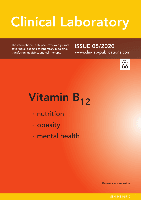
Indian Journal of Clinical Biochemistry
metrics 2024
Innovating Diagnostics, Enriching Lives
Introduction
The Indian Journal of Clinical Biochemistry, published by SPRINGER INDIA, serves as a pivotal platform for researchers and professionals in the field of clinical biochemistry. With an ISSN of 0970-1915 and E-ISSN 0974-0422, this esteemed journal has been disseminating high-quality research since its inception in 1986. As a Q3 ranked journal in Clinical Biochemistry according to the 2023 category quartiles, it occupies a significant position within the realm of biochemistry, genetics, and molecular biology—ranked #61 out of 117 in Scopus. The journal's scope emphasizes the advancement of knowledge and practices in clinical diagnostics, aiming to bridge the gap between laboratory research and clinical application. Positioned in the vibrant academic landscape of India, the Indian Journal of Clinical Biochemistry is a crucial resource for students, researchers, and professionals seeking to stay abreast of the latest trends and innovations in the field, thus fostering the development of clinical biochemistry both nationally and globally.
Metrics 2024
 0.43
0.43 1.50
1.50 1.60
1.60 55
55Metrics History
Rank 2024
Scopus
IF (Web Of Science)
JCI (Web Of Science)
Quartile History
Similar Journals

PEPTIDES
Innovating Insights in Health and DiseasePEPTIDES, published by Elsevier Science Inc, is a premier journal in the field of Biochemistry that has made a significant impact since its inception in 1980. With a current Impact Factor that places it in the Q2 and Q3 quartiles across multiple categories—including Cellular and Molecular Neuroscience and Endocrinology—this journal serves as a vital resource for researchers and professionals seeking to advance their understanding of peptide biology and its broad implications in health and disease. The journal's Scopus ranking reflects its relevance and esteemed contributions, ranking in the top percentiles in various biological disciplines. While currently not available as an open-access option, the depth of peer-reviewed research articles, reviews, and communications offered aims to push the boundaries of knowledge in physiology and molecular biology. As it converges towards 2024, PEPTIDES continues to be a beacon for innovative research that inspires the next generation of scientists.

Biochemistry Research International
Unlocking the secrets of molecular biology, one study at a time.Biochemistry Research International is a prominent and dynamic journal published by Hindawi Ltd, dedicated to advancing knowledge in the field of biochemistry. With its Open Access model established since 2010, the journal provides unrestricted access to high-quality research, thereby fostering global communication among researchers and professionals. Operating out of the United States, Biochemistry Research International serves as a vital platform for disseminating cutting-edge findings in biochemistry and molecular biology, holding a respectable Q2 ranking in its category as of 2023. The journal's scope encompasses a wide array of topics including but not limited to biochemical processes, genetic engineering, and molecular interactions, making it an essential resource for students and seasoned researchers alike. With an impact factor reflective of its significance in the academic community, Biochemistry Research International continues to play an integral role in shaping the future of biochemistry research.

Turkish Journal of Biochemistry-Turk Biyokimya Dergisi
Transforming research into impactful biochemical advancements.Turkish Journal of Biochemistry-Turk Biyokimya Dergisi, published by WALTER DE GRUYTER GMBH, is a pivotal open-access journal in the field of biochemistry that serves as a forum for innovative research and scholarly discourse. Since its inception in 2009 and transitioning to open access in 2015, this journal has gained recognition within the scientific community, reflecting a commitment to advancing knowledge in biochemistry and related medical sciences. With a diverse scope that encompasses molecular biology, clinical biochemistry, and the broader arena of biochemical studies, Turkish Journal of Biochemistry offers researchers, professionals, and students access to impactful studies and current developments. Although currently positioned in the lower quartiles in specific categories, the journal aims to enhance its visibility and engagement as it converges towards a promising future, fostering collaboration and knowledge exchange among biochemists across Turkey and around the globe. This journal is vital for anyone seeking to stay abreast of emerging trends and research findings in biochemistry.

MOLECULAR MEDICINE
Empowering Research through Open Access InsightsMOLECULAR MEDICINE, published by SPRINGER, is a leading scholarly journal dedicated to advancing the fields of genetics and molecular biology with a focus on clinical applications. Since its inception in 1994, it has evolved to become a pivotal platform for disseminating innovative research findings, achieving a remarkable Q1 ranking in multiple categories, including Genetics, Molecular Biology, and Molecular Medicine as of 2023. Featuring an Open Access model since 2000, the journal ensures that cutting-edge research is freely available to the global scientific community, facilitating collaboration and knowledge exchange. With a commitment to high-quality peer-reviewed content, MOLECULAR MEDICINE serves as an essential resource for researchers, healthcare professionals, and students seeking to stay at the forefront of molecular research and its implications for medical science. For those interested in contributing to or accessing vital research in this dynamic field, MOLECULAR MEDICINE stands out as a premier choice.

Biochemia Medica
Unlocking Insights in Health and DiseaseBiochemia Medica is a premier open-access journal that has been at the forefront of advancing knowledge in the fields of medical biochemistry and laboratory medicine since its inception in 2006. Published by the Croatian Society of Medical Biochemistry & Laboratory Medicine, this journal serves a vital role in disseminating high-quality research findings and reviews that contribute to the understanding of biochemical processes in health and disease. With an impressive performance in the Scopus ranking, it holds a Q2 quartile category in both medical biochemistry and clinical biochemistry for 2023, reflecting its commitment to scholarly excellence and relevance in the field. As an open-access journal, Biochemia Medica ensures that research is freely accessible, fostering collaboration and innovation among researchers, healthcare professionals, and students globally. Positioned within a rapidly evolving scientific landscape, this journal is dedicated to bridging the gap between laboratory research and clinical application, making it an indispensable resource for anyone interested in the intersections of biochemistry and medicine.

MAGNESIUM RESEARCH
Fostering Insights into Magnesium's Metabolic FunctionsMAGNESIUM RESEARCH, published by John Libbey Eurotext Ltd, is a leading journal in the fields of biochemistry, clinical biochemistry, and molecular biology, dedicated to advancing the understanding of magnesium's role in biological systems. With an ISSN of 0953-1424 and an E-ISSN of 1952-4021, this journal has been a vital resource for researchers and professionals since its inception in 1988, now converging into its 2024 issues. Positioned in the Q4 category for 2023 across several biochemistry domains, the journal is indexed in Scopus, providing a significant platform for the dissemination of research findings. Despite its current rankings reflecting a need for further impact, the journal serves as an important venue for emerging research that explores the biochemical and metabolic functions of magnesium, underlining its crucial influence on health and disease. Although primarily published using traditional access models, the content remains relevant for those seeking to deepen their knowledge in this essential mineral’s biological importance. Researchers, students, and professionals in related fields will find MAGNESIUM RESEARCH an invaluable addition to their academic resources.

BIOCHEMICAL JOURNAL
Championing High-Quality Research in Molecular BiologyBIOCHEMICAL JOURNAL, published by Portland Press Ltd, stands as a leading publication in the fields of Biochemistry, Cell Biology, and Molecular Biology, reflecting a commitment to advancing scientific knowledge since its inception in 1945. With a distinguished Q1 ranking across these categories and impressive Scopus rankings, the journal serves as an invaluable resource for researchers, professionals, and students alike, facilitating critical discoveries and innovative research practices. Although not currently offering open access, the journal provides a platform for high-quality peer-reviewed articles, ensuring rigorous standards in the dissemination of biochemical research. Spanning over seven decades and continuing through to 2024, the BIOCHEMICAL JOURNAL fosters an environment where cutting-edge biochemical research thrives, supporting the global scientific community's efforts to address complex biological questions and enhance our understanding of fundamental cellular processes.

Journal of Medical Biochemistry
Unveiling the Biochemical Secrets to Better HealthJournal of Medical Biochemistry is a distinguished peer-reviewed journal published by the SOC MEDICAL BIOCHEMISTS SERBIA, focusing on the significant intersection of biochemistry and medicine. With an e-ISSN of 1452-8266, this Open Access journal has been enriching the academic community since 2007, providing vital insights and research findings that advance the field of medical biochemistry. Based in Belgrade, Serbia, the journal plays a pivotal role in disseminating contemporary research, highlighted by its impressive standings in the 2023 quartile rankings, featuring Q2 in Medical Biochemistry and Q3 in Clinical Biochemistry. The journal is recognized in Scopus with rankings that position it within the discerning area of medical biochemistry and clinical biochemistry, attesting to its influence and relevance. By promoting innovative research and facilitating an open exchange of scientific ideas, the Journal of Medical Biochemistry is a crucial resource for researchers, professionals, and students dedicated to uncovering the biochemical underpinnings essential to improving human health.

Clinical Laboratory
Connecting Knowledge with Clinical Laboratory InnovationsClinical Laboratory is a reputable journal dedicated to the interdisciplinary field of clinical biochemistry, genetics, and molecular biology. Published by CLIN LAB PUBL in Germany, this journal provides a platform for the dissemination of original research, reviews, and key insights into laboratory practices and innovations that play a crucial role in modern medicine and diagnostics. With an ISSN of 1433-6510 and a consistent publication history since its inception in 1964 and converging through 2024, it is indexed within the Scopus database, ranking in the 30th percentile among its peers. Although classified in the third quartile for 2023 in the field, Clinical Laboratory continues to contribute valuable knowledge and fosters collaboration among researchers, professionals, and students. Notably, it does not currently operate as an Open Access journal, which emphasizes its commitment to maintaining high-quality peer-reviewed content accessible through institutional and library subscriptions. For those in the domain, Clinical Laboratory serves as a vital resource for the latest advancements and trends shaping the future of clinical laboratory science.

STEROIDS
Transforming understanding in biochemistry and endocrinology.STEROIDS is a premier peer-reviewed journal published by Elsevier Science Inc. that has continuously contributed to the field of biochemistry, clinical biochemistry, endocrinology, molecular biology, and pharmacology since its inception in 1963. With a notable impact factor reflecting its quality research, STEROIDS is categorized as Q3 in several critical areas, including Biochemistry and Clinical Biochemistry, while achieving a Q2 ranking in Organic Chemistry. The journal serves as an essential resource for researchers, professionals, and students alike, disseminating groundbreaking findings related to steroid hormones and their physiological roles. This global platform facilitates access to significant advancements in chemical and biological sciences, thereby promoting a deeper understanding of steroid interactions and applications in health and disease. For further engagement, readers can access a wealth of knowledge to advance their studies and professional practices from this influential journal.